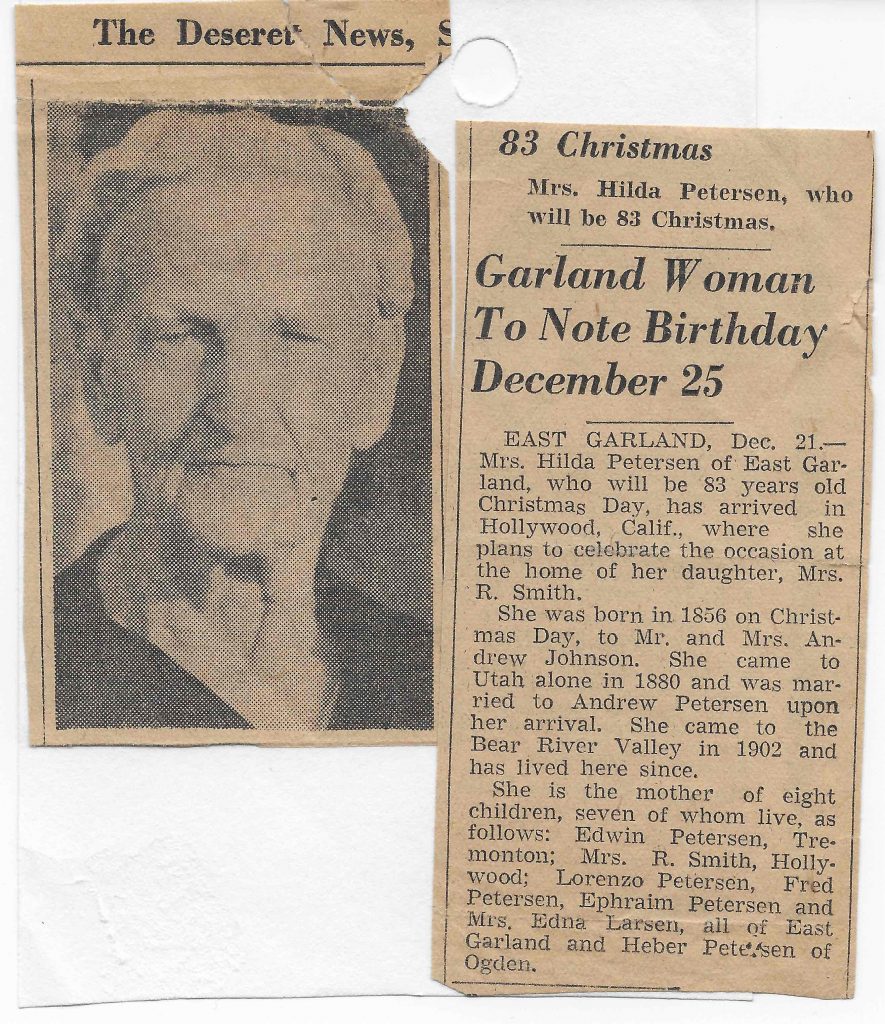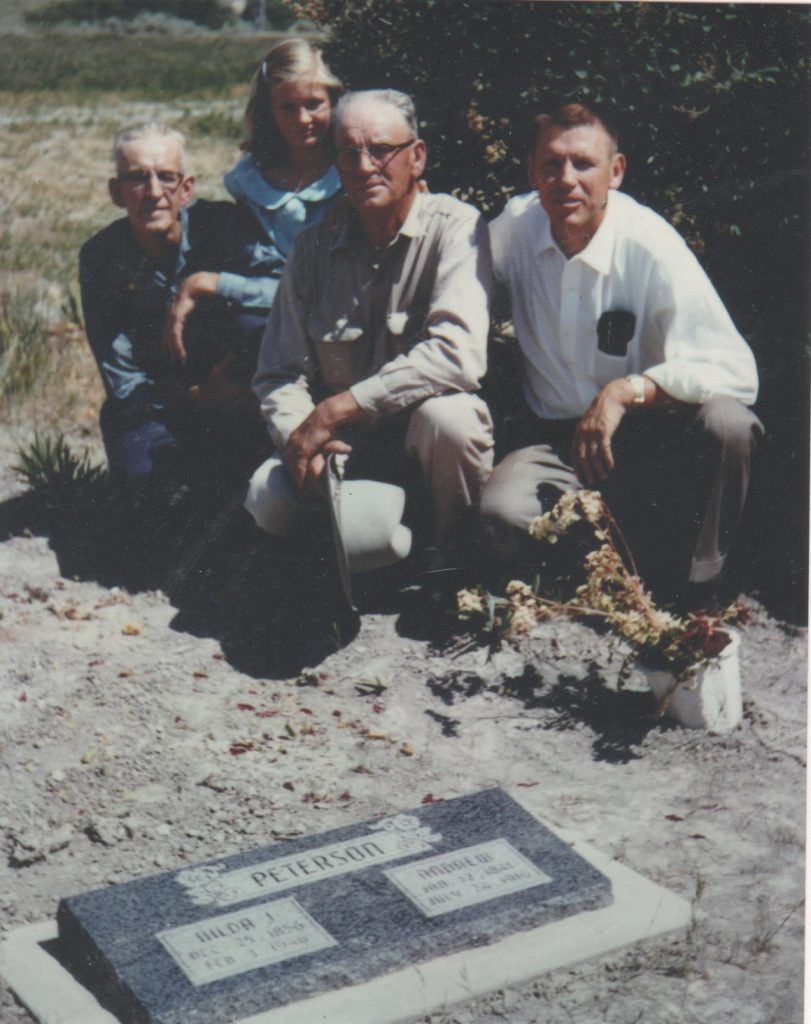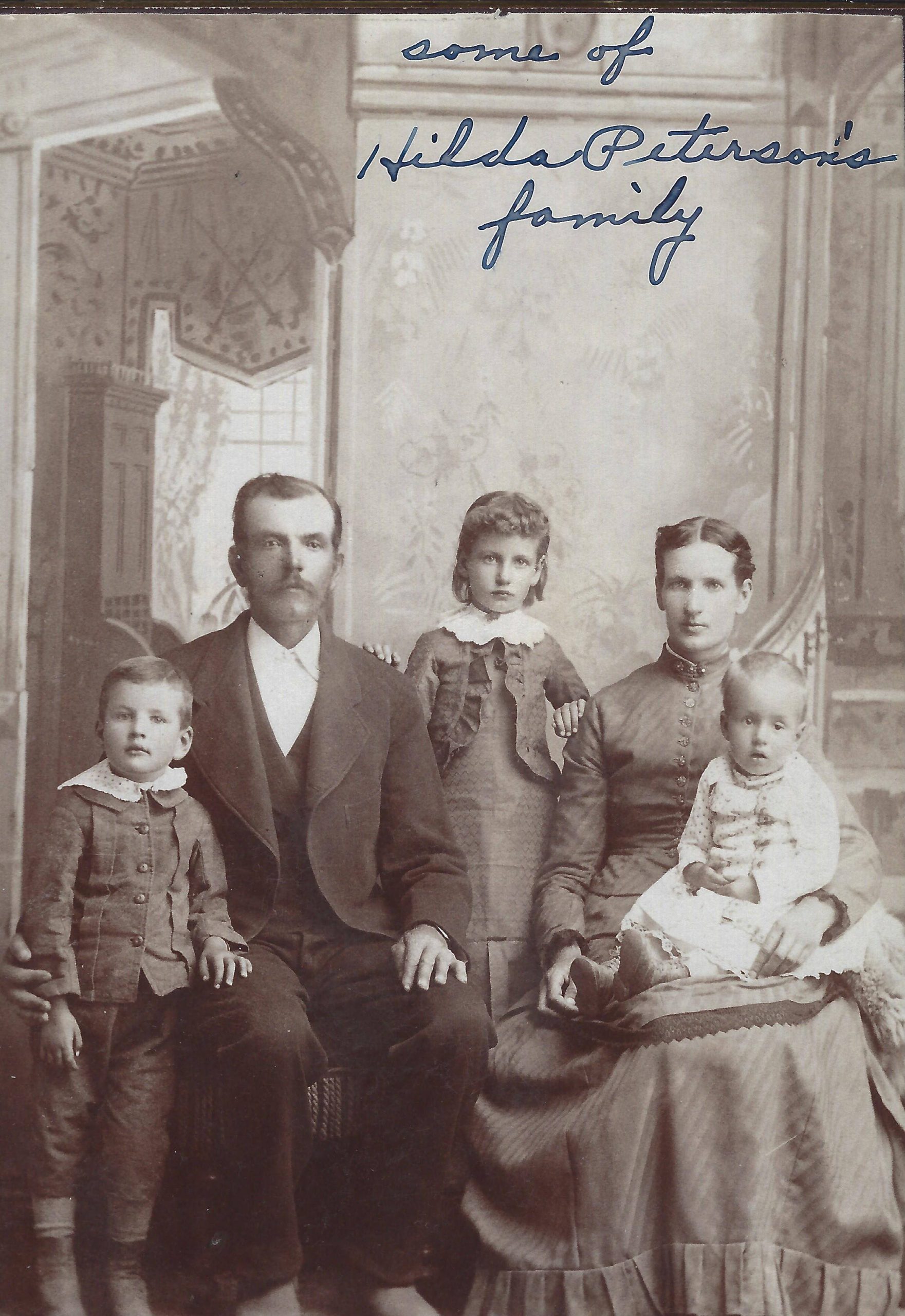
Andrew Peterson and his wife Mathilda Maria Johnson with their three children Edwin, Adelia and Lorenzo.

Maps
Maps related to where they were born, where, lived and where they are buried

Records
Records related to land grants, christenings, military, newspapers, census and etc.

Timeline
Timeline of the important events related to their lives.

Pictures
Family pictures of letters that help us understand who they were.
We don’t know much about Andrew Peterson. He came from Sweden around May 1869. He was a farmer all his life. In June of 1880 Hilda set out on a grand adventure to travel to the United States departing from Hökhuvud, Uppsala. She entered the Salt Lake Valley from Sweden in September of 1880 and met and married Andrew Peterson in the endowment house that October. They were 15 years apart. They ended up having 8 beautiful children but they lost one and ended up raising seven. They moved to Whitney, Idaho for a short time and then moved back to Utah by 1890 and settled on a farm in Abraham, Millard County. They weren’t wealthy by any means but they were very happy. They owned their farm and after a time sold it and moved. By 1910 they relocated and built a house in East Garland, Box Elder County and continued to farm the land. Andrew’s father and mother joined the church and immigrated at a later time settling in Plain City, Utah. Hilda’s parents did the same, joining a little later than she did and immigrating to the Salt Lake Valley. Andrew received his patriarchal blessing October 8th 1878 in Salt Lake City, Utah. Hilda received his about ten years later in June of 1888, South Jordan, Utah. We have those blessings which are precious and sacred to the family. Andrew died in 1916 at the age of 74 of a heart attack. The church was central in their lives. They worshipped and loved the Lord living up to the covenants they made in the temple.
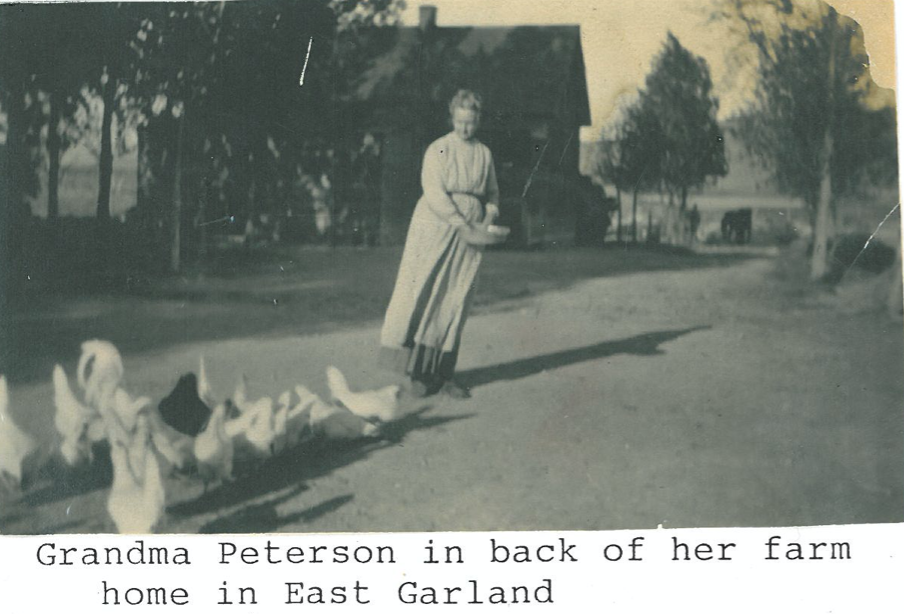
Hilda's Autobiographical Life Sketch
The following is transcribed from a narration in my Grandmother’s (Hilda Peterson) own handwriting made on two sheets of foolscap paper and represents a few chronological points of interest in her life. These sheets mailed to me by Aunt Edna on Jan 29, 1952 –Howard Lundeen
This was written in 1936
Hilda Marie Johnson Peterson was born in Skäfthammar, Upplands on December 25, 1856. I was the second child– having a brother that died as a baby. My father was a soldier and had a small home and I grew up in that place ’til I was 7 then it became necessary for my parents to move on account of death in my mother’s family to a place called Widicka (?). I had started school that was called Gimo Bruk then, after moving, I continued my schooling in Widdicka till I was 13 under a teacher named Mr. Söderborg. After that I went under a study for the Parish Priest and passed through that with honor which took a year then I was entitled to be a member of the Lutheran Church that was the state church. My father was farmer then so during the time that I growed up it became necessary for me to help what I could with the farm work and I had to do a good deal of herding cows and sheep as well as horses and it was very tedious job for we had small places to herd them on, so I had no time to play while as a child as I grow older I had to engage in hard work in the field through harvesting hay and grain during the falls we had to work in flax which took much labor as the women had to do all that. We pulled the flax up by the roots and tied them in sheeves like grain and set them up to dry after it got dry we had a coarse comb that we pulled it through to get the seeds off then we spread it out thin on stubble ground for about three weeks till the fiber begin to get looser then we raked it up and hauled it home and dried it in a house built for that. There we had a rig to break it with to get the stems from the fiber then it was beaten with a wooden I call it sword to get all the stems away so that we got the flax so that we pulled it through a finer comb and the flax was then ready to spin but we had to spin what we combed out of the flax too, so we could use that too, for weaving cloth for towels. I spent the winter evenings spinning yarn ready for weaving in the spring as we had to weave all that we had to wear both underwear and dresses too, but I enjoyed doing it and was never lonesome. I had to learn to knit while I was a little girl as I had to make my own stockings. After I was sixteen I was allowed to go out on an evening to mingle with the young people. My parents were religious and good people and thought dancing was a sin although they themselves indulged in it themselves when they were young but they finally let me go and I enjoyed my self to the fullest with what there was. I can look back on that time with pleasure now for I had a good time and I have nothing to regret but when I was 19 there was a religious revival. Before that time there was only old people that was religious and I did not want to be alone and young so I did not join any of then but during that revival there was both old and young so I was thinking about religion too, but it seemed like that the young went away from religion again, but I felt that when I had started I was going to stay for I was sincere and wanted to find the truth but it took sometime to fined it. I believed that God would send some one with the Gospel, but meantime I was reading the Bible especially the New Testament for I expected to find salvation there for I thought that that was the only word of God but I could not seem to get any satisfaction there either as I could understand that it had to be men ordained of God, and I used to wish that I had lived in the days of the Apostles for I found that the Saints in that day knew that they had the true Gospel. As time went on–it was in the year 1878–there came an Elder of the Church of Jesus Christ of Latter-Day Saints, and I heard immediately that he had the true Gospel and I was baptized the 28th day of August 1878. I had my father’s consent to get baptized, but my mother was bitter. But I was old enough–22yrs.
Then I left Sweden the 5th of June–that is, I left home. I had not been away from home before. I only worked for a family for 6 months– so it was quite an ordeal to leave home under those conditions. I was among the first Mormons who immigrated from that part of the country. I would not go through it again, but I have never regretted that step.
I arrived in Utah the 28th of July 1880. I was married the 28th of October the same year to Andrew Peterson in the old Endowment House. I have gone through many things no so pleasant, but the Gospel is the same. I came here for the Gospel’s sake and I have taken pleasure in working mostly as a teacher in Relief Society here in East Garland for the last 25 years. I was a teacher in Whitney Ward, Idaho for two years. That was in Idaho– and I was a teacher in Riverside, Bear River Stake. It was at a time when the Relief Society stored wheat and I have helped quite a bit with that. I was counselor in Primary for some time.
Now I can sit and think of those things. I feel not the strength that I used to have, but I have the will. I am not in my eightieth year, but feel hail and hearty- and I am thankful for that I have been four winters in Los Angeles.
Sometime has gone since I started this and it is now 1939, and I am going on my eighty third year, and I have enjoyed my life so far. My only wish now is to see my children and grandchildren being interested in the Gospel and live it. Then I will be satisfied to go when my time is up.
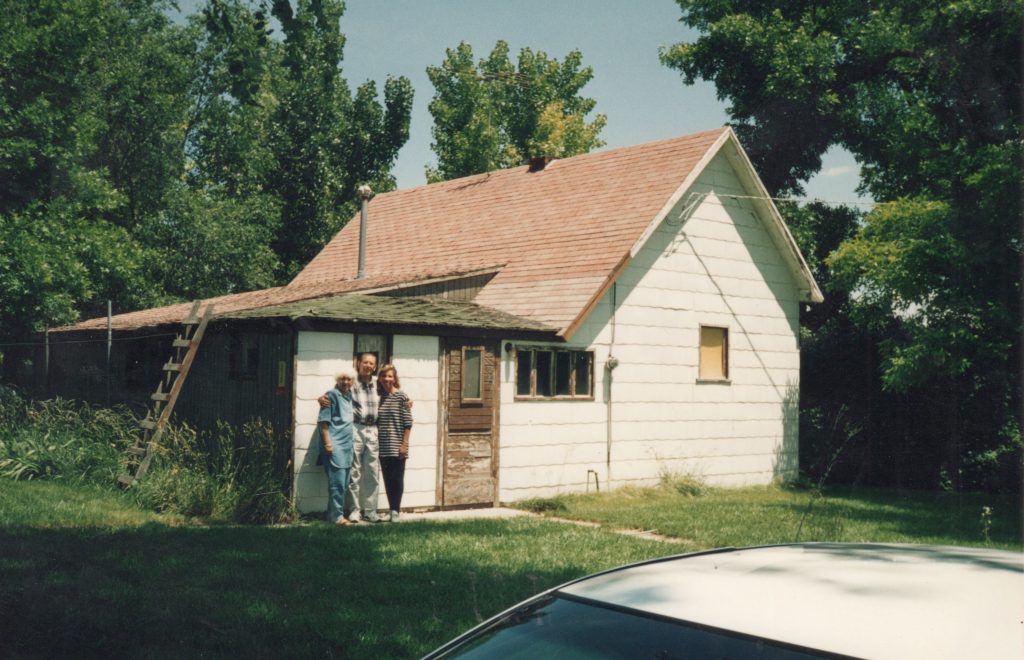
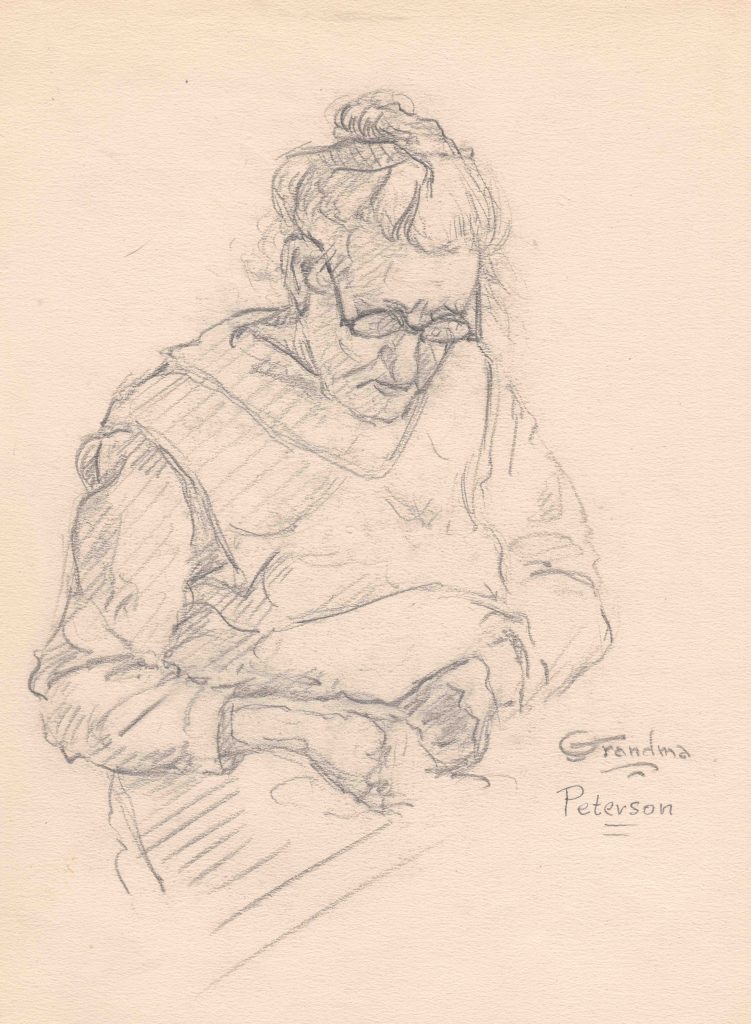
Memories of Grandma Hilda Peterson
By her Grandson Howard K. Lundeen
Being the youngest may have accounted for the opportunity given me to live with grandmother on the farm in Northern Utah. My most pleasant childhood memories are of this area; of the pigs, cows, chickens, sheep, horses; of the irrigation canals, the caves, the fresh mown hay and clean straw stacks. Much more comes to memory of Christmas with snow and ice and the delight of receiving, on Christmas morn, a small box of candy and perhaps an orange; of the winter nights, especially when the large kitchen was occupied by all of us because of the warmth and comfort of the big wood burning stove and how my uncles would peel and slice potatoes and law them on the hot plate of the stove to be blistered and seared by the heat— then salted and eaten.
While here I still continued to spend much time with Grandmother on the farm– and was used by my uncles to work in the hay, sugar beets, and grain which were principal crops then. It was here in Garland that my last half-sister, Margaret was born to Mother in the year 1921. Several pleasant winters and summers were spent here.. I learned to swim in the irrigation canals, fish in Bear River, and hunt rabbits, ride horses bare-back and on Saturday nights go to town behind Warren on his favorite horse. I attended both the grade school in Garland as well as the little country school in East Garland, where my education was of short duration and my experiences not pleasant one. It was here, in haying time, when I would be permitted to handle the derrick horses that were used to fork and lift the hay from wagon to stack–or barn; Bud and Rock were the horses names: A short round fat one– the other being tall, gaunt, and boney. I recall the caves, a name we gave to the small canyon running close by the farm house formed by the erosion of Bear River winding through its bottom; How the milk cows were turned out there to graze and were usually returned to the barn for milking by me; and the scotch collie dog “scotty”
While still residing at 1191/2 No. Kenmore Ave., that Grandma Peterson used to visit us, particularly during the winter months. We also had my Uncle Eph and Warren come to live with us for various lengths of time. Grandma was one of the most angelic people…. Her testimony and faith were never shaken by her numerous hardships and adversities.
Erick Gillen Story- Letter from Hilda about her life with her Uncle Erick who was nearly her age- They lived together and joined the church together-- The Best Of Friends
Erick Gillen’s mother (Anna Margreta) was Hilda’s Grandmother. She was sick and Hilda’s mother(Anna Maria) and father left their hometown to take care of this very young boy and Anna Maria’s step-father and sisters. Hilda writes of her grandmother, Anna Gretta’s death and she recounts memories of her great grandmother in a letter to her cousin.
Erick Gillen, Life Story (1852-1878)
History of Erick Gillen’s life as taken from his own journal, started June 20, 1881, written in Swedish and translated to English; with other experiences related by friends and relatives who knew him. Most of this history was written October 1945 by his daughter, Mamie Gillen Pierson.
Erick Gillen, son of Erick Abrahamsson Gillen, and Anna Margreta Andersson, was born September 8, 1852 in Hokhufvud, Stockholm, Sweden. His mother, Anna Margreta (Hilda’s Grandmother), had been married before and had four living daughters: Anna Maria (Hilda’s Mother), Greta Stina, Cathrina Gustava or Stava and Josephina who was about three years older than Erick. Their father, Erick Ersson Ronnberg had died and their mother remarried Erick Abrahamsson Gillen( Hilda’s step-father). Erick was the only child of this union.
Erick started school when he was seven years old, learning reading, writing, and arithmetic until he was ten years of age. When he was ten, his mother died (June 30, 1863); and from this time on, Erick was thrown upon his own resources. He was a versatile youth, filled with love and a desire to assist his father in the many jobs that had to be done. He helped support himself and his father in those early years of his life. Erick’s father did farming and chopped down trees for fuel.
The following letter, written February 10, 1936 by Matilda or “Hilda” Maria Jansson Petersson, Erick’s half-niece who grew up with him, gives her memories of their childhood.
Dear Niece (actually a cousin],
I was glad to hear from you and I will try to answer some of your questions [regarding my memories of Erick Gillen] the best I can. It seems like my memory is poor, but I will be glad to tell you what I remember. I don’t know much about Erick’s childhood, as we were not born at the same place. My father enlisted as a soldier in the army before he was married, and the [Swedish] Government gave the soldier a house and some land and the village had to keep them with grain and wood, so when my mother [Anna Maria Ersson Ronnberg] married him, she moved over there; it was quite a long ways between so we did not get there very often.
That village was called Shafthammar, and where my mother and uncle [Erick Gillen] were born was called Wedicka [Hokhufvud, Stockholm, Sweden]. I did not see him—can’t remember more than once and then [that one time] we had a mishap. He had a stone swinging from his hand and I got in the way so it hit me in the forehead and it bled. He was there with his mother. I can’t remember anymore about it than that I was afraid they would scold him. He was almost eleven years old when his mother died. After his mother died, my mother felt that we had to move there and take care of the family as Aunt Josephine was young, too, and Aunt Stava was a cripple.
We moved there, but it was hard on [my] father as he did not have horses and implements to farm with. They had an auction and he bought things. It was quite different for my parents as they had it so good where they lived. My father’s father was living with us there. I was seven years old and Uncle’s father was there with us as long as they had the farm, and my great grandmother [Erick’s mother’s mother] lived with us, too. So it got to be quite a family. Uncle lived at home until he went on his mission. We were a happy family.
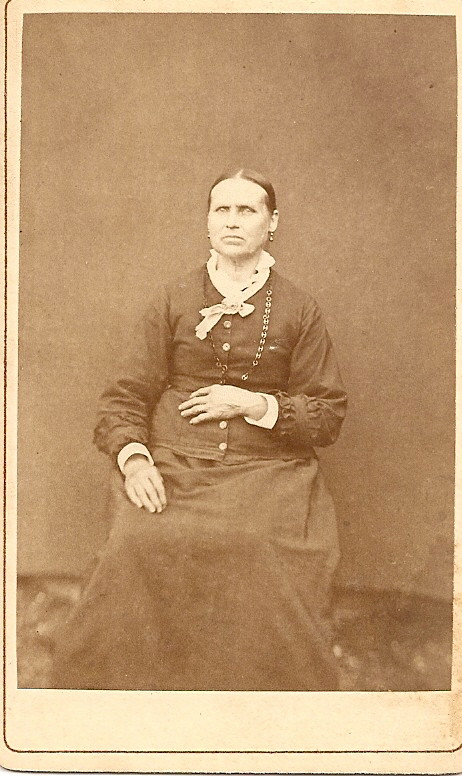
When his mother died, I guess I must have been with my mother there, as I can remember seeing her die, and then I forgot everything else; only that Uncle had gone to catch fish for her and when he came home, she was dead. Then my mind is blank, but after that my mother and father gave up their soldier home and moved back there where my mother was born as they had a farm.
The farm was rented from a big landlord, but my great grandparents and my grandparents had lived there, so after my grandfather [Erick Ersson Ronnberg] died, my grandmother married Uncle’s father. I don’t know anything about him [Erick’s father, Erick Abrahamsson Gillen] before that, but knowing Erick, you would think that his father would have been a very bright and intelligent man, but I guess he had not had any schooling, so he could not read nor write, and he was not mechanical. He was a very hard worker with the axe and spade, but if the handles came off, he could not put them on. Uncle did not get his intelligence from him, neither temperament, for his father was very hot-tempered.
Well, my father bought horses and implements at the auction and took care of the farm for they [the grandfathers] could not. Aunt Stava was an invalid, Aunt Josephina was about 14; and Uncle was only 11; and his father needed a home, so they all stayed there. After that, we grew up together. He was four years older than me. We used to herd cows and horses in the field. There were big piles of stones in the hills and we used to build houses of them. He built houses for me; and there was one big hill there that puts me in mind of the Hill Cumorah now. There was one end of it that was lower and gravelly and when we had the chance, we used to dig in the gravel; we had this idea that there should be something buried inside that hill. When Uncle was on his last mission, he told me he visited these places. He wished I could have been there with him. How we should have enjoyed those memories. We always liked to be together. We used to eat bread and milk out of the same bowl lots of times.
I can’t remember my grandmother more than she was sick and I saw her die. I can remember my Great Grandmother better. She was over 80 when she died. I did not see my grandfather, [Erick Ersson Ronnberg], but they said he was a very kind and good man. Uncle’s father stayed with us as long as my father had the farm, after Uncle had gone on his [First] mission. He was there [in Dacksta] and died when your father came back on his second mission.
After I got older so that we went out together among the young people, we got very much attached to each other for he was so good. I never saw him angry. He never swore, or used tobacco, or drank. He had a strong character. He could not be led astray. As for religion, we belonged to the State Church—that was Lutheran. We did not have to be what you may call “religious” to belong to the state church, so we went to dances.
His room as a child, I don’t know, but I have to tell about his room after he was older. After we moved there, he and his father had a room together joining the kitchen. There was another little room that we used for a store room, and he wanted to fix that for himself, so he cleaned it and papered it. He had a bed and two chairs and a half-round table, varnished with a gilt flower in the middle; a nice curtain for the window, and he got a stove. I don’t know where he got that as there were no stoves used then. There was no chimney to that room, so he just put the stove pipe through the roof. I kept that room clean. We had that room to ourselves. If we could not be together in the daytime, we had to have some talks in the evening, so I went in there before I went to bed. We seemed to have so much to talk about. When we were working as we had to in the fields in the summertime, we always worked close together so we could talk. If we went anywhere, whether it was to work or to church, we were together. It seemed we could not be separated and the folks were so used to us being together that if there was any work to do, they put us together.
While we were younger, my parents did not believe in playing cards, but Uncle had found some cards—only low ones—so he wrote “Kings” and “Queens”. So when we went out to do chores at noon, we would go up on the hayloft and play cards for a while, and was it fun! I guess because we had to steal away to do it, but we got over that. We did not play cards any more when we got older. I don’t think that he ever played cards again. He had his girlfriends, and I had boyfriends, so we were not friendly that way; but I don’t know how two people could be truer friends than we were.
We used to wonder and say we did not know how we could separate for we realized that we could not be together all our lives. The time came, when there was a religious revival, and we got religious then. But the religion we heard was not satisfactory so we did not join any sect. A few young people got together and we would read the Bible—until a Mormon Elder, C. P. Larson, came. We both embraced the gospel and were baptized the same day. About a year after that, he was called on a mission as a local Elder. He was willing to go, and I was willing for him to go—but we worried over saying “good-bye”, so I have to tell you how that happened. He had to take the Steamer to Stockholm, and that passed Oregrund where the Westins lived [Amanda Westin would become Erick’s future wife]. So a few of us went with him and we stayed there at the Westin Home. The Steamer was to come by there at eleven o’clock in the evening and they had to row out to meet it. While we were sitting, talking, we heard the whistle and we all rushed to get the boat that went out—but when we got there, that boat had gone. There was a girl there with us. I don’t know who she was, but she got hold of a boat and he jumped in. I don’t think we had time to shake hands, so that worry was over. We only wrote to each other after that. My Father and Uncle were very chummy. There was never an unkind word between them, and we were a very happy family.
Uncle was looked up to by both old and young. I wish I had the language to tell more about him for he was so good to all. I have forgotten so much. [end of letter]
Erick and his father who was bereaved and unhappy when his wife died, lived on in the family home; Erick’s half-sister, Anna, and her husband, Anders Jansson Gron, who was also a farmer; and their small children came and lived with them and helped with the farm. Erick and his father worked together.
The limited schooling that Erick received in his childhood days continued to his fourteenth year, and was of the quality usually found in the village schools of the day. His earnest desire to learn came not from books alone; he drew many lessons from life and nature, in its various phases as he grew up amidst glorious surroundings. The forests and flowers provided understanding and peace.
Erick desired the beautiful in life. His chaste, sweet mind yearned for knowledge. By the time he was fourteen, he could work right along with his father, doing efficient work as a carpenter—making many constructive articles with but simple tools. He seemed to have the ability to succeed in whatever task he attempted. When he was fifteen years old, he went to read for the Priest Fricsen in Hokhufvud’s Church of Sweden. He received a New Testament. He was a Lutheran, and as time went on he began to think of life hereafter. He was consistent, faithful and kind. He lived in harmony with scriptural teachings.
In the year, 1873, [he was 20 years old] on May 26th, he entered the Regiment until June 17, 1874. The Bible had been Erick’s chief consolation in his youth and the best evidence of divine purposes. At the age of 25 years, the spirit of God worked upon him and he became more interested in his salvation. His life was marked by spiritual growth attained through great hardships. He was devoted to God’s will, and as he read about baptism in the Bible, he realized it was not like his baptism. He read and searched, but could not find any religion that taught the way the Bible did.
In the fall of 1877, he went to Stockholm to hear the Baptists preach, but he did not hear any. He and some of his friends began studying the Bible. On March 25, 1878, he went to a town called Ano where he talked to some called “Sinfree” sect. They had been baptized, but had no leader called of God. He still sought the right, and on June 30, that same year, he went to Gimo Bruk in Upland, and there conversed with a C. Gustafsson of the Mormon Church. As he read John 3:35, “Jesus answered, Verily,verily, I say unto thee, except a man be born of water and of the spirit, he cannot enter into the Kingdom of God”, a testimony came to him which he could never forget. He borrowed a Danish Bible reference book and compared it with the Bible he had.
In July when he learned more from the Latter-Day Saint Missionaries as they preached and bore testimony, by the spirit of God, he felt it was the true gospel. On August 11, 1878 He had gone to the Uppsala District meeting and heard several of the LDS Missionaries explain the principles of the Gospel. He was baptized that same night at 11:00 pm by Branch President C. P. Larson, and confirmed by John Larson, Conference President. [It is interesting to note, that the Book of Mormon was first published in Swedish in the year 1878 – Helen Lundskog Eddington, a granddaughter, has a copy of the 1st Swedish Edition of the Book of Mormon.] From Erick’s youth, he was optimistic—never discouraged. He had faith in his own ability because he had been trained religiously from his early youth and found it easy to accept the true Gospel of Jesus Christ when it was brought to him in his homeland by the humble missionaries. He was fully converted and received the gospel. At 2:00 a.m. that same night he left for his home. When he reached home, on August 12th, he knelt in prayer to his Heavenly Father in thankfulness for His love and kindness. On August 14th Erick bore his testimony to his friends of the great joy which had come to him.
